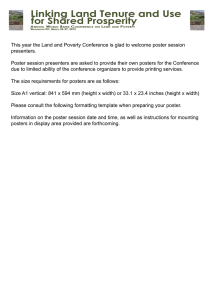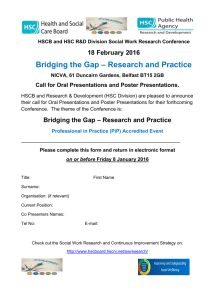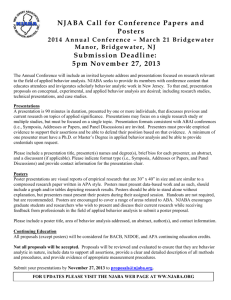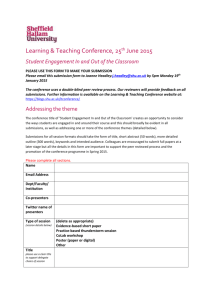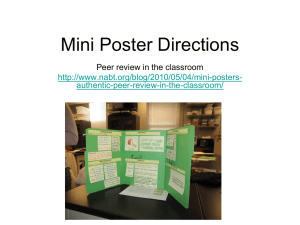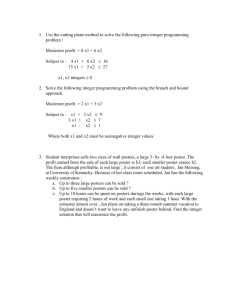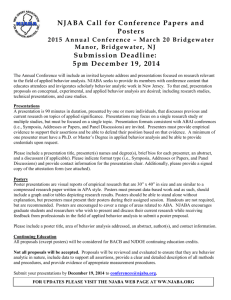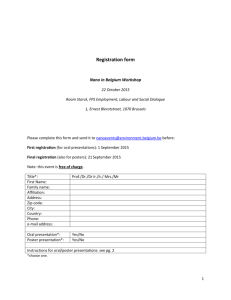Learning & Teaching Conference, 19th June 2014
advertisement
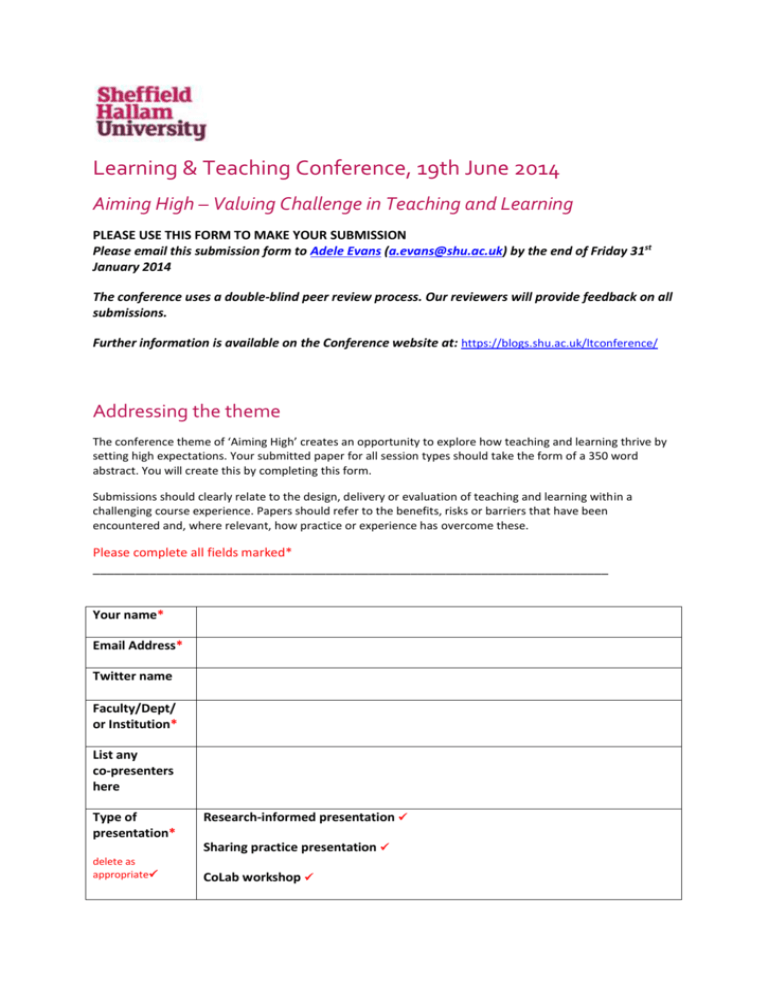
Learning & Teaching Conference, 19th June 2014 Aiming High – Valuing Challenge in Teaching and Learning PLEASE USE THIS FORM TO MAKE YOUR SUBMISSION Please email this submission form to Adele Evans (a.evans@shu.ac.uk) by the end of Friday 31st January 2014 The conference uses a double-blind peer review process. Our reviewers will provide feedback on all submissions. Further information is available on the Conference website at: https://blogs.shu.ac.uk/ltconference/ Addressing the theme The conference theme of ‘Aiming High’ creates an opportunity to explore how teaching and learning thrive by setting high expectations. Your submitted paper for all session types should take the form of a 350 word abstract. You will create this by completing this form. Submissions should clearly relate to the design, delivery or evaluation of teaching and learning within a challenging course experience. Papers should refer to the benefits, risks or barriers that have been encountered and, where relevant, how practice or experience has overcome these. Please complete all fields marked* _________________________________________________________________________ Your name* Email Address* Twitter name Faculty/Dept/ or Institution* List any co-presenters here Type of presentation* Research-informed presentation Sharing practice presentation delete as appropriate CoLab workshop Poster Other Title* please use a clear title that will encourage delegates to attend your session Short Abstract* 50 words aims, objectives, focus of the session. This will be used on the conference website. Relationship to the conference theme and to one or more of the conference topic areas* [DELETE this text as appropriate - Topics: Academic innovation; Inspiring and supporting students; Fostering independence and peer support; Technology changing the learning landscape; The students’ view] See 'Topics' title below for further information. A maximum of 350 words to be used from this point please Full Outline* 300 words For presentations and posters: Building on the aims and objectives above, specify the details of your paper/session. Outline what you have done, what findings or observations you will share, how this relates to other work by you or others, and what conclusions can be drawn, etc. Or for CoLabs: Proposals must clearly demonstrate how participants will be actively engaged in working together during the workshop to create something useful. For example, workshop organisers can offer frameworks for curriculum design, data sets, or technologies as the basis of activities. Workshop leaders should indicate how the workshop is likely to lead to collaboration beyond the conference, e.g. Peer Supported Review activities or Special Interest Groups. Keywords* Add up to 10 key words or phrases to help us match submission to sessions and to help delegates select sessions Audience & Impact* Who specifically will find your session useful and why? Recording Please indicate if you agree to your session being filmed or audio recorded and made available via the web. Delete as appropriate I agree to my session being recorded I do not agree to my session being recorded Topics The conference is organised around a broad set of topics within the main conference theme of 'Aiming High – Valuing Challenge in Teaching and Learning'. In most cases submissions will directly address one or more of the topics, which will cover, but are not limited to: Academic innovation: creativity and innovation; currency and scholarship; academic peer support; excellent teaching in the lecture theatre; evaluating innovation; creative spaces for teaching; inspiring through assessment and feedback; valuing difference; excellent partnerships. Inspiring and supporting students: staff-student interaction and collaboration; active learning; keeping students on task; renegotiating engagement; supporting excellent teaching; skill or literacy; communities of practice. Fostering independence and peer support: student belonging; student transition; communities of practice; embracing diversity and challenge. Technology changing the learning landscape: technology supported innovation; increasing access; redefining the classroom; mobile learning; social media; making connections; on the cutting edge. The students’ view: defining excellence; enhancing the curriculum through staff-student coproduction; student researchers; student conferences; using my technology my way; peer cooperation; students as partners. Session types (50 minutes) Research-informed presentations should aim to give a brief summary of a piece of research or a project, either completed or still in progress. Papers will discuss evidence relating to their academic innovation or scholarly study of teaching and learning. Presentations should be designed to engage the audience and will not be read as fully fledged papers. Research-informed presentations are paired with another presentation for each 50-minute session. Each presentation should last for 10-15 minutes, with a further 10 minutes for questions/discussion. Each session will be facilitated to maximise audience engagement and ensure good time keeping. It is expected that presenters will later write up their paper for an academic journal such as the University's Student Engagement & Experience Journal. Sharing practice presentations are short dynamic showcase presentations which last 10 minutes and use no more than 10 slides. They focus on aspects of practice, in particular explanations of innovative practice likely to be useful to or inspire other delegates. Sharing practice presentations are grouped into three for each 50-minute session. 20 minutes for questions to all three presenters is set aside at the end of the session and is facilitated by the session Chair. Authors should include at least one point in their abstract which will inform this broader concluding discussion. CoLab workshops will last 50 minutes. Proposals must clearly demonstrate how participants will be actively engaged in working together during the workshop to create something useful. For example, workshop organisers can offer frameworks for curriculum design, data sets, or technologies as the basis of activities. Workshop leaders should indicate how the workshop is likely to lead to collaboration beyond the conference, e.g. Peer Supported Review activities or Special Interest Groups. Posters will be presented in a session with between 5 and 10 other posters. Proposals for posters will first be submitted in text. On acceptance, presenters are requested to produce a visually engaging poster in A1 portrait format. A PDF version of the poster should also be supplied for the conference website by 19th June. The finished poster should not contain extensive amounts of detailed text, but may provide further detail through links and/or associated handouts. A good poster design will attract immediate interest through its title and graphic arrangement. It is likely to include photographs, diagrams, drawings, charts, screen shots or other visual elements. Presenters will be prepared to talk to their posters during the allocated conference session by explaining the topic and answering the questions of those attending. Other - we welcome suggestions for alternative contributions. We expect all conference contributions to result in an artefact which will be reproducible in a common digital media format (e.g. PowerPoint, Slideshare, audio or video recordings and screencasts, PDFs of posters and or hand outs, etc, as appropriate and useful). This should work well as a stand-alone resource for future reference by both those who attended the conference and those who didn't. Please email this submission form to Adele Evans (a.evans@shu.ac.uk) by the end of Friday 31st January 2014
